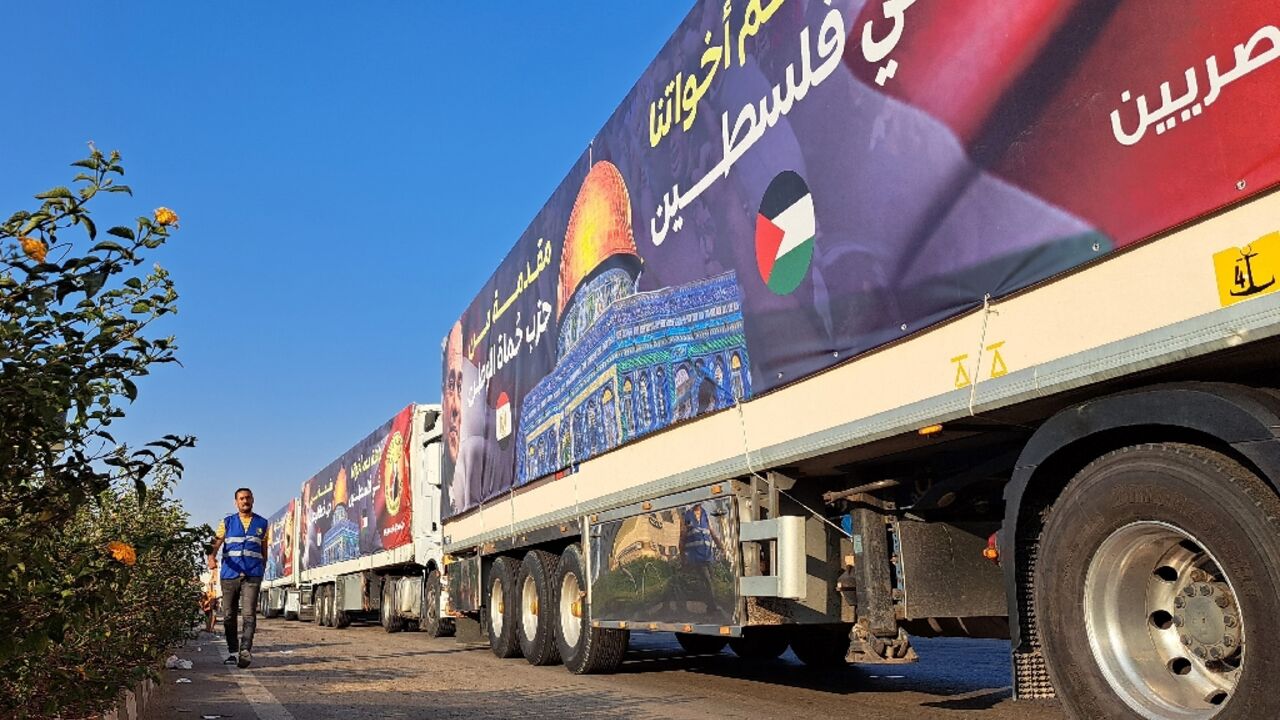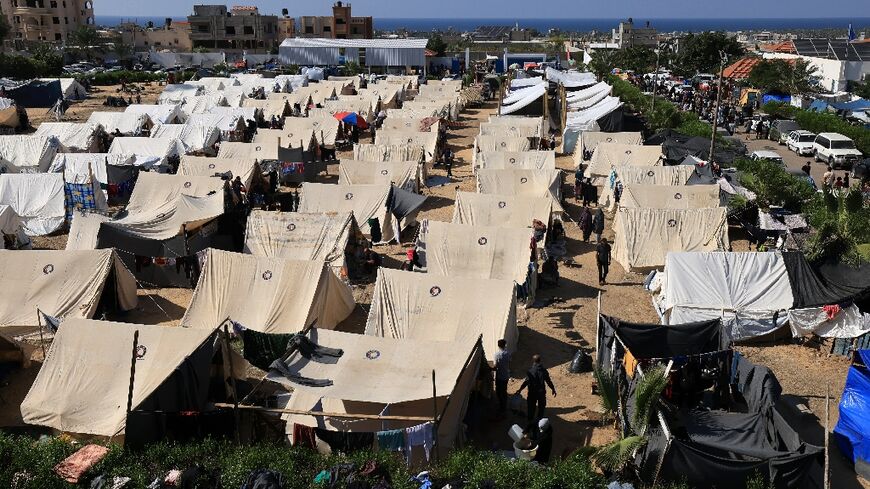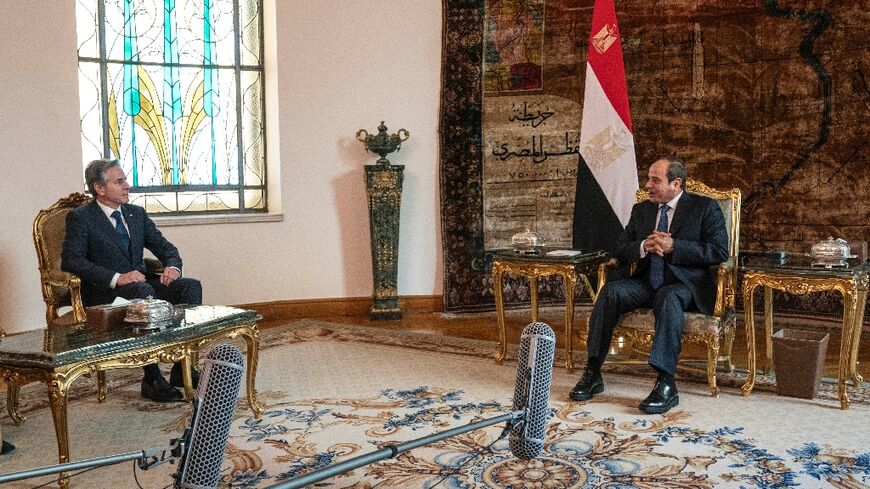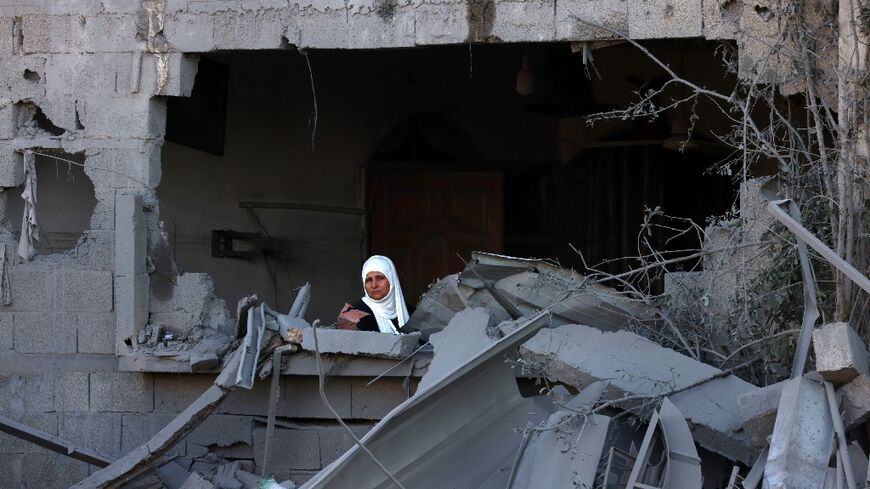Egypt's Sisi rejects Gaza refugee influx, blames Israel for aid block

Egypt's president said Wednesday he would not allow any mass influx of refugees from Gaza, saying it would set a precedent for "the displacement of Palestinians from the West Bank into Jordan".
After talks with visiting German Chancellor Olaf Scholz, President Abdel Fattah al-Sisi blamed Israel's air strikes on the Rafah crossing between Gaza and Egypt for the failure to get aid to the territory's 2.4 million people.
"The displacement of Palestinians from Gaza to Egypt means the same displacement will take place for Palestinians from the West Bank into Jordan," Sisi warned.
"Subsequently, the Palestinian state that we are talking about and that the world is talking about will become impossible to implement -- because the land is there, but the people are not."
Sisi's meeting with the German chancellor came as Gaza faced a 12th straight day of ferocious Israeli bombardment in retaliation for a shock cross-border attack launched by Hamas on October 7 that killed at least 1,400 people, most of them civilians.
Nearly 3,500 people have been killed in Gaza, which is nearly out of electricity, food, water and fuel.
Pressure has mounted for aid to be allowed in through Egypt's Rafah crossing with Gaza, the only access to the besieged territory not controlled by Israel.
Sisi said Egypt "did not close" the crossing, but that "developments on the ground and the repeated bombings by Israel of the Palestinian side of the crossing have prevented its operation".
Hundreds of lorries carrying aid have been waiting for six days on the Egyptian side of the crossing, which Israeli aircraft has bombed four times.
Scholz told reporters Berlin and Cairo "are working together to get humanitarian access to the Gaza Strip as quickly as possible."
The two men also warned against the threat of regional spillover, with the Egyptian president calling for "immediate international intervention" to put a stop to "dangerous military escalation that may get out of control".
Scholz reiterated that Germany sought to avoid a "conflagration in the Middle East" and warned Hezbollah and Iran "once again not to intervene in this conflict".
- Peace could 'fall apart' -
Sisi said he could "call on the Egyptian people to come out and express their rejection" of the displacement of Palestinians from Gaza, "and you would see millions of Egyptians" in the street -- where protests have been banned for nearly a decade.
Shortly after, Egyptian media reported that thousands had demonstrated nationwide in solidarity with Gaza.
Cairo's Al Azhar University -- a leading institution in Sunni Islam -- issued a call late on Tuesday for Muslims to "invest their wealth in supporting Palestine and its oppressed people", urging them to "review their dependence on the arrogant West".
In 1979, Egypt became the first Arab state to make peace with Israel following the Camp David accords of the previous year.
Although public opposition to Israel remains widespread, both countries have maintained security collaboration and steady diplomatic ties.
That peace is at risk of disintegrating, Sisi said, if there is a mass exodus of Gazans to Egypt's neighbouring Sinai Peninsula that would risk turning it into "a new base for terrorist operations against Israel".
"Israel would have the right to defend itself and its national security, and therefore direct strikes on Egyptian lands," he said.
Palestinian president Mahmud Abbas too has warned that the displacement of Gazans to Egypt would amount to a "second Nakba" -- a reference to 1948 when more than 760,000 Palestinians fled or were expelled from their lands during the war that accompanied Israel's creation.
Most of Gaza's population are refugees from that exodus.
Egypt has repeatedly refused to accept what it calls the transfer of Israel's responsibility as an occupying power, including to "provide for the safety of civilians" living under its occupation.
Dismissing comments by pundits about Sinai being a sparsely populated desert area, Sisi suggested Israel's Negev Desert as an alternative refuge for Gazans.
"Palestinians could be moved there until Israel is finished with what it has declared is an operation to eliminate armed groups" from Gaza, the president said.
"And then it could return them if it wished," he added.





